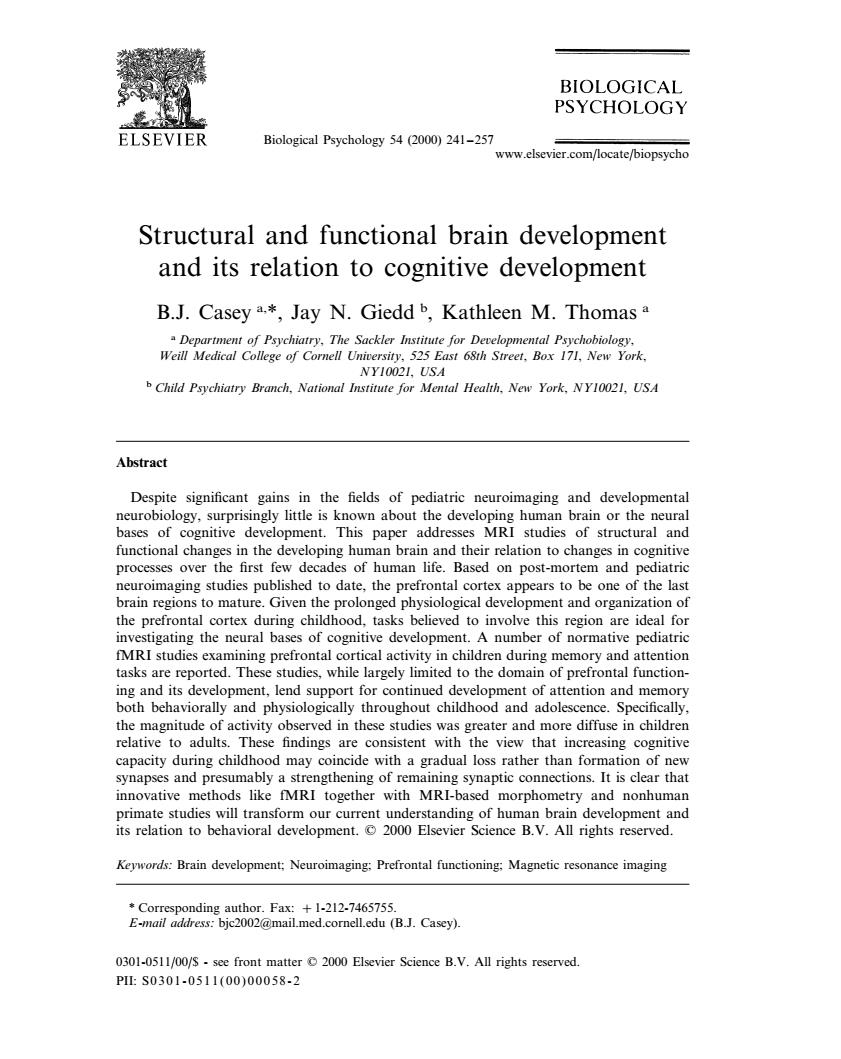正在加载图片...

BIOLOGICAL PSYCHOLOGY ELSEVIER Biological Psychology 54(000)241-257 ww..com/locate/biopsycho Structural and functional brain development and its relation to cognitive development B.J.Casey *.*Jay N.Giedd b,Kathleen M.Thomas C No Abstract Despite significant gains in the fields of pediatric neuroimaging and developmental neurobiology,surprisingly little is known about the developing human brain or the neural bases of cognitive development.This paper addresses MRI studies of structural and functional changes in the developing hun nan brain and their relation to changes in cognitive proces s over the nrst f Base on post-mort tem and pe e.the pr cortex appea s to be one of the l frontal cortex duri ood.tasks believed to involve this region are ideal for n nr a e mmt e fMRI studies examining prefrontal cortical activity in children during memory and attention tasks are reported.These studies,while largely limited to the domain of prefrontal function- 3ng support o r continued are consistent with the view that incr easing cognitive capacity during childhood may coincide with a gradual loss rather than formation of new synapses and presumably a strengthening of remaining synaptic connections.It is clear that innovative methods like fMRI together with MRI-based morphometry and nonhumar Keywords:Brain development:Neuroimaging:Prefrontal functioning:Magnetic resonance imaging see fronBiological Psychology 54 (2000) 241–257 Structural and functional brain development and its relation to cognitive development B.J. Casey a,*, Jay N. Giedd b , Kathleen M. Thomas a a Department of Psychiatry, The Sackler Institute for De6elopmental Psychobiology, Weill Medical College of Cornell Uni6ersity, 525 East 68th Street, Box 171, New York, NY10021, USA b Child Psychiatry Branch, National Institute for Mental Health, New York, NY10021, USA Abstract Despite significant gains in the fields of pediatric neuroimaging and developmental neurobiology, surprisingly little is known about the developing human brain or the neural bases of cognitive development. This paper addresses MRI studies of structural and functional changes in the developing human brain and their relation to changes in cognitive processes over the first few decades of human life. Based on post-mortem and pediatric neuroimaging studies published to date, the prefrontal cortex appears to be one of the last brain regions to mature. Given the prolonged physiological development and organization of the prefrontal cortex during childhood, tasks believed to involve this region are ideal for investigating the neural bases of cognitive development. A number of normative pediatric fMRI studies examining prefrontal cortical activity in children during memory and attention tasks are reported. These studies, while largely limited to the domain of prefrontal functioning and its development, lend support for continued development of attention and memory both behaviorally and physiologically throughout childhood and adolescence. Specifically, the magnitude of activity observed in these studies was greater and more diffuse in children relative to adults. These findings are consistent with the view that increasing cognitive capacity during childhood may coincide with a gradual loss rather than formation of new synapses and presumably a strengthening of remaining synaptic connections. It is clear that innovative methods like fMRI together with MRI-based morphometry and nonhuman primate studies will transform our current understanding of human brain development and its relation to behavioral development. © 2000 Elsevier Science B.V. All rights reserved. Keywords: Brain development; Neuroimaging; Prefrontal functioning; Magnetic resonance imaging www.elsevier.com/locate/biopsycho * Corresponding author. Fax: +1-212-7465755. E-mail address: bjc2002@mail.med.cornell.edu (B.J. Casey). 0301-0511/00/$ - see front matter © 2000 Elsevier Science B.V. All rights reserved. PII: S0301-0511(00)00058-2